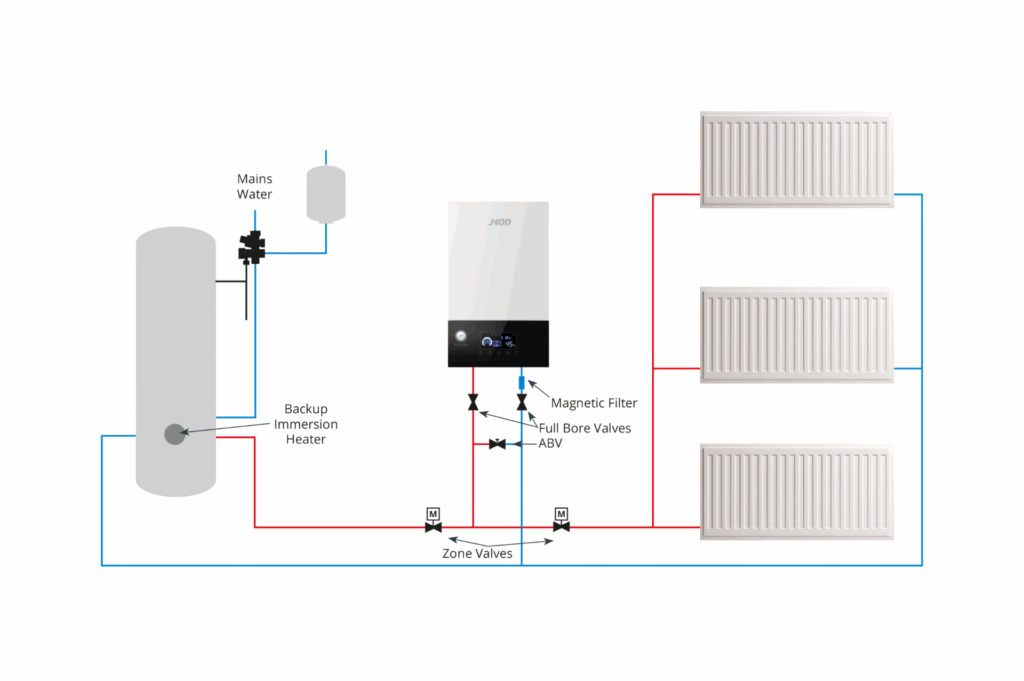Electric Boiler Installation Guide- Homeowner’s Need to Know
Electric boilers are becoming a popular choice for homeowners looking for a cleaner, more efficient way to heat their homes. They’re compact, generally easier to install than gas boilers, and ideal for properties off the gas grid. If you’re planning an electric boiler installation, here’s what you need to know—from electrical requirements to heating system compatibility.
Why Choose an Electric Boiler?
Electric boilers are more efficient than gas boilers and do not require a gas connection. Electric boilers are similar in size to traditional gas boilers and have a slightly lower average installation cost. They are particularly suitable for:
- Homes not connected to the gas grid
- Homeowners looking to reduce their carbon footprint
- People want a low-maintenance, eco-friendly heating solution
Electric boilers are a great choice for hot water and space heating.
Who is responsible for an Electric Boiler Installation?
Electric boiler installation should always be carried out by qualified professionals. This includes:
- A certified electrician to install the dedicated electrical circuit and connect the boiler to the mains
- A heating engineer or plumber to manage plumbing, hot water, and heating system design
In some cases, a specialist heating installer may handle both tasks or work with a trusted electrician. The most important thing is to ensure the installer is experienced with electrics and pressurised hot water systems. Safety comes first.
Power Requirements for Electric Boilers Installation
Can You Use a Ring Main?
No. Electric boilers draw too much power for a standard ring main. They must be connected to the mains using a dedicated circuit protected by a circuit breaker.
Do Electric Boilers Need a Dedicated Circuit?
Yes. Like electric ovens, electric boilers require a dedicated electrical circuit with:
- Properly rated cable runs
- Circuit breakers (MCB) sized for the boiler’s load
- A local isolation switch for safety and maintenance
What Is a Dedicated Circuit?
It’s an electrical line that powers only one appliance—in this case, the boiler. It runs directly from the main consumer unit with its own breaker.
Does Cable Size Matter?
Absolutely. The wrong cable can overheat and become a fire hazard. A qualified electrician will select the correct cable size based on the boiler’s power rating and installation conditions.

Understanding S-Plan and Y-Plan Heating Systems
S-Plan Heating Systems
- Multiple heating zones (e.g., upstairs and downstairs)
- Separate thermostats and motorised valves for each zone
- Uses a wiring centre for control
- Efficient and common in modern homes
Y-Plan Heating Systems
- Uses a single three-port valve
- Controls both hot water and heating, but without zoning
- Common in older homes or where space is limited
Both systems are compatible with JNOD electric boilers when wired correctly.
Preparing for an Electric Boiler Installation
Here’s how to prepare before installing your electric boiler:
- Plan ahead: Get a heating professional to assess your home and recommend the right boiler size
- Choose a location: Install near water and electrical supplies, with space for maintenance
- Check electrical capacity: Ensure your home’s electrical system can support the boiler
- Upgrade panel if needed: Larger boilers may require a new or upgraded consumer unit
Electric Boiler Installation Steps
- Disconnect the old system (if replacing one)
- Mount the new boiler in the chosen location
- Connect water and electricity
- Test the system to ensure everything works correctly
Conclusion
Switching to an electric boiler is a smart choice for many households—especially those aiming to reduce carbon emissions and simplify home heating. With proper planning and professional installation, electric boilers offer clean, reliable heating with long-term benefits.
For more details or help choosing the right system, reach out to the JNOD team. We’re happy to help with your electric boiler installation.
